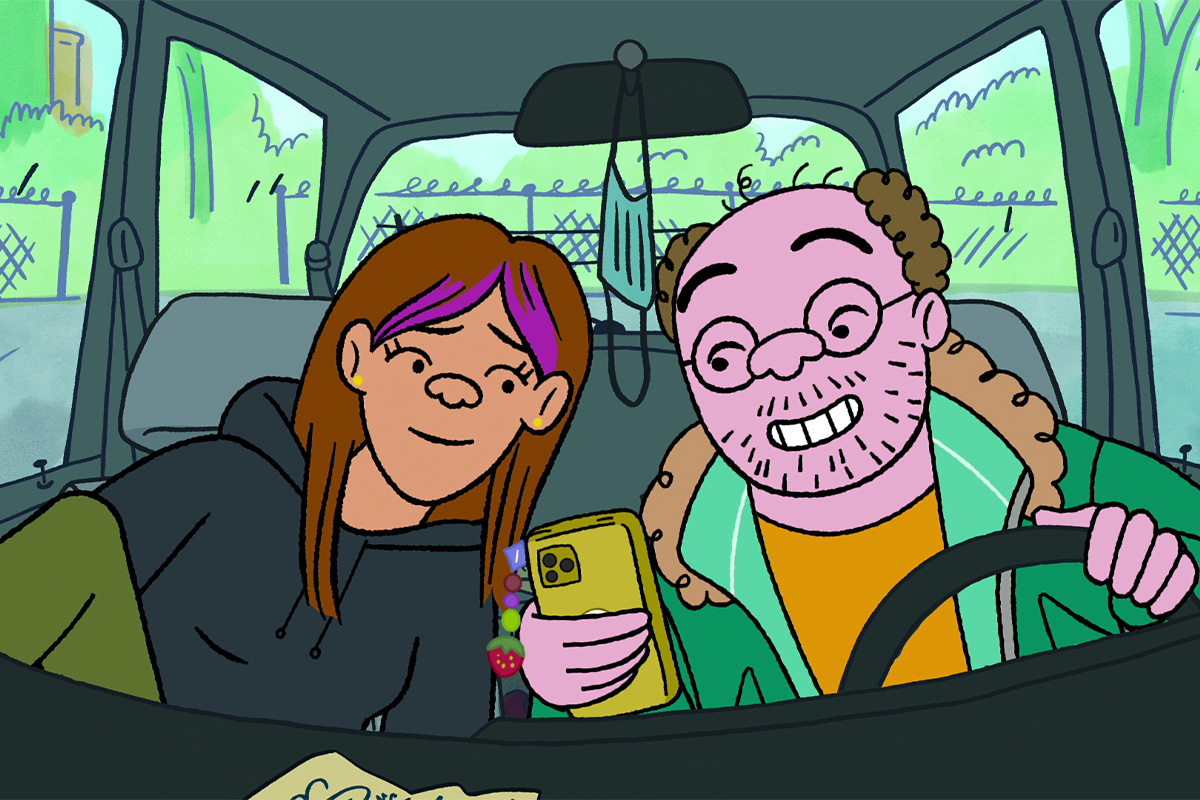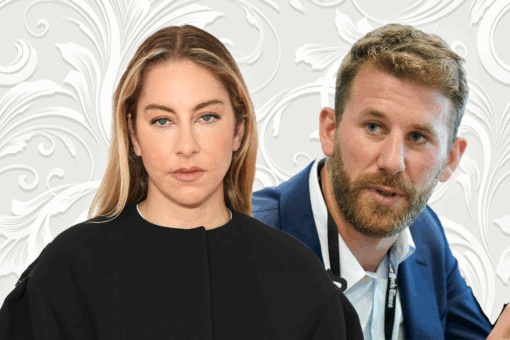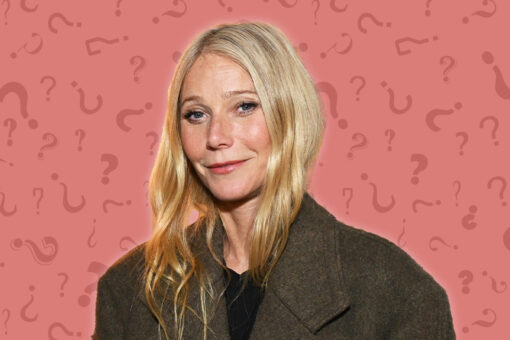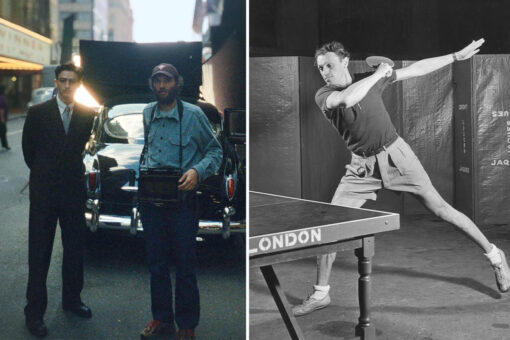“Yiddish is camp,” Hannah declares in the first season finale of “Long Story Short.” The daughter to non-Jewish mom Jen and a purposefully secular Jewish dad Avi, Hannah may not be halachically Jewish. (To which we at Hey Alma say, whatever! She’s Jewish!)
But the photography-loving tween with purple highlights displays a growing interest in her Jewish heritage over the course of the season — including telling Avi while waiting for the bus one day that her Instagram algorithm has been serving her Yiddish word of the day posts. When Avi questions her use of the word camp, offering that perhaps she meant that Yiddish is kitsch, Hannah clarifies, “I meant old but cool.”
To Hannah’s point, Yiddish is many things! It can be campy or kitschy, it’s certainly old (nearly 1,000 years, can you believe?) and in our humble opinion, it’s definitely cool. Judeo-German, as the language is also known, carries the beauty, ritual, tradition and, of course, strife of many Jewish peoples’ ancestors. It’s home. It’s a mama loshen (mother tongue). And it’s absolutely all over “Long Story Short.”
So if you find yourself watching this extremely Jewish animated show and unsure of what a Yiddish word means, you’re in the right place. Below is a guide to all the Yiddish (and some Hebrew) in “Long Story Short” season one. (All definitions come from the Jewish English Lexicon unless otherwise noted.)
In alphabetical order:
Babka: “A sweet bread that contains various fillings (as of chocolate, cinnamon or poppy seeds), is typically rolled and twisted before baking in a loaf pan, and is often topped with streusel,” per Merriam-Webster. In episode three, the Jewish bakery Yoshi goes to is hilariously named Babka Streisand.
Bris: From the Hebrew, bris is the Ashkenazi variation of the word “brit.” It’s used to refer to the “circumcision ceremony; the celebration surrounding it.” However, a bris or brit can also mean “covenant, agreement.” In episode two, Naomi chats with a family member about Yoshi’s bris.
Bubbe: Grandmother. Ashkenazi Jews also use variations of this word and this spelling to refer to a grandmother. These include, bube, bobe, bubby, bobby, buba, etc. The Schwoopers refer to their maternal grandmother as Bubbe.
Bubbeleh: This is a term of endearment meaning “sweetie” or “darling.” In episode eight, Naomi’s mom Annie calls Naomi this after she hurts herself.
Challah: From the Hebrew, challah is a “braided bread that is eaten on many Jewish holidays and every Shabbat.” In episode 10, the Schwoopers use Hawaiian rolls as a replacement for challah when celebrating Shabbat with Yoshi in a motel.
Chutzpah: Jewish English Lexicon describes chutzpah as having “guts,” “confidence,” “nerve” and/or “audacity.” In episode five, Shira wears a t-shirt reading “Camp Chutzpah.”
Farkakte: When Elliott loses it over Yoshi’s TAMIT (There’s a mattress in there) debacle in episode three, he uses this word to describe the situation. Farkakte is an adjective meaning “lousy,” “crappy,” “messed up” or ridiculous.
Farshtunkene: Elliott also uses this word in his episode three TAMIT crash out. It is also an adjective, meaning “stinking” or “contemptible.”
Feh: “Feh” is technically not a word. Rather, it’s a very Yiddishkeit expression of annoyance or disgust. Uncle Barry’s bereft girlfriend Vivian uses it in episode 10 when telling Avi that she doesn’t need a ribbon to perform kriyah, despite the rabbi’s suggestion. “Feh, I don’t need a ribbon,” she says, purporting to want to rip some of her own clothes. (Though not her Donna Karan dress.)
Fleishig: Meat products or utensils used for meat, for kashrut purposes. In the first episode, Avi’s girlfriend Jen uses the fleishig sponge to scrub Bubbe’s dairy dishes, much to Naomi’s dismay.
Goy/goyim: In both Yiddish and Hebrew, a goy or goyim are non-Jewish people. It can be, but isn’t always, used derogatorily. The words “goy” and “goyim” come up a few times in the show.
Hechsher: “A rabbinic stamp or seal of approval, typically designating a product as kosher.” In episode four, Kendra points out that Shira didn’t get a honey bear for Rosh Hashanah with hechsher on it.
Kichel: Per The Nosher, kichels are an old-world Ashkenazi Jewish cookie. They are made by frying dough and adding sprinkled sugar on top and are typically bow-tie shaped. In episode eight, Naomi makes kichels for Hannah.
Kinderlach: Little children, a diminutive of “kinder,” meaning children. “Have a nice day with the other kinderlach,” Avi says to his daughter in episode 10, lightly teasing her for learning Yiddish.
Kitsch: Gaudy, tacky or in bad taste. When Avi corrects Hannah when she says “Yiddish is camp,” he tells her she likely meant “Yiddish is kitsch.”
Knish: “Eastern European dumpling with thin dough filled with potato, kasha, onion, meat and/or other ingredients.” In episode four, Shira becomes fixated on making knishes just like the ones her mother used to make.
Kosher: Coming to Yiddish from the Hebrew, kosher means “acceptable according to kashrut.” Kosher can also reference Jewish ritual law — for example, a kosher mezuzah or menorah. Colloquially, it can also mean generally “acceptable.” Kosher first comes up in episode one directly after the fleishig sponge incident.
Kugel: “Baked pudding or casserole made with eggs and various ingredients, including noodles, potatoes or spinach.” Before Shira goes on her knish-making adventure in episode four, she considers trying to make a kugel.
Kvell: “To feel or express pride; to be extraordinarily pleased.” At Yoshi’s bar mitzvah, Danny Wegbreit utters the iconic phrase, “Kvellin’ like a felon.”
Kvetch: To kvetch is to complain, typically about something small. In episode three, Naomi tells Yoshi not to kvetch about his temp job.
Mazel tov: From the Hebrew “mazal tov,” “mazel tov” means congratulations. This phrase is uttered at Yoshi’s bar mitzvah.
Mishegoss/meshugana: Mishegoss is foolishness or craziness, while meshugana means crazy or specifically, a crazy person. Elliott describes the TAMIT situation as mishegoss in episode three. Later, in episode eight, Naomi’s mom Annie refers to a dry brisket as meshugana.
Noodge/nudzh: As a noun, a noodge/nudzh is someone who whines. This word can also be a verb, however, and in that case it means “to bore” or “to pester or nag.” In episode nine, Naomi’s older sisters Carol and Susan lovingly refer to Naomi as their “little noodge” while speaking in honor of her at the JCC.
Nu: An interjection meaning “so what?” or “hurry up.” Uncle Barry uses this word in episode one while angrily confronting Jen and Naomi about why his late wife Sylvia didn’t get a candle at Yoshi’s bar mitzvah.
Nudnik: Someone who’s annoying. Hannah calls her dad a nudnik in episode 10. (And she’s right to say it.)
“Oyfn Pripetshik“: A Yiddish song by M.M. Warshawsky about a religious teacher instructing pupils on the Hebrew alphabet. It literally means “On the Hearth.” In episode 10, after Hannah says Yiddish is camp, Avi jokingly responds, “Who could forget the B-52’s rendition of ‘Oyfn Pripetshik.'”
Oy gevalt: Literally, this phrase means “Oh, violence!” But it’s better interpreted as “Woe is me!” Naomi says this phrase during Yoshi’s intervention.
Oy vey: An interjection of surprise or exasperation. It literally means “oh woe.” Oy vey is used throughout “Long Story Short.”
Pogrom: Per Merriam-Webster, a pogrom is “an organized massacre of helpless people.” It is typically used to describe organized violence against Jews living in the Russian Empire during the 19th and 20th centuries. It comes to Yiddish from the Russian language, in which it means “devastation.” In episode nine, Elliott’s puppet character Cousin Moishe jokes in front of a JCC audience, “I haven’t seen a crowd this dead since the pogrom at my wedding.”
Putz: A fool or jerk. As a verb, “to putz” means “to waste time.” The first episode features Uncle Barry using the word “putz” in a background conversation at Shabbat.
Schlep: The Jewish English Lexicon includes three definitions of “schlep” and they are all equally important to include. This word can be a verb, meaning to “carry or lug,” or “to travel from one place to another when one would prefer not to.” It can also be a noun describing “an annoyingly long journey.” In episode two, “schlep” is used to describe traveling between New Jersey and California.
Schlimazel: “Unlucky person; the constant butt of idiotic or unfortunate happenings.” Schlimazel can also describe bad luck. While Naomi’s dad shouts at the TV in episode eight, he calls a member of the Brooklyn Dodgers a “schlimazel.”
Schmaltz: “Schmaltz” can refer to rendered chicken fat, often included in Ashkenazi recipes. It can also mean excessive wealth or the quality of sentimentality, particularly in art. In “Long Story Short,” “schmaltz” comes up when Shira looks at Naomi’s recipe book.
Schmear: A schmear can mean cream cheese. It can also be used as a verb meaning “to spread.” In episode 10, the Schwoopers recall the origin of their “Is a schnook not entitled” inside joke, and someone asks if a schnook is not entitled to schmear.
Schmeckle: An irritating person, or a little penis. Oh the wonders of Yiddish! Shira and Kendra’s obstetrician uses “schmeckle” during the couples’ ultrasound.
Schmendrick: Someone who is a jerk, is inconsequential or who “falsely thinks he can succeed.” “Schmendrick” is another of Naomi’s dad’s words of choice will watching the Brooklyn Dodgers.
Schmooze: To chat or a noun describing the chat itself. In episode one, “schmooze” comes up the first time Shira and Avi make their “Is a schnook not entitled?” joke.
Schnook: A sucker. An incompetent, but still likable, person. The Schwoopers’ “Is a schnook not entitled?” joke comes up throughout the series.
Shabbos: The Ashkenazi pronunciation of “Shabbat,” the Jewish Sabbath. The first night of Yoshi’s bar mitzvah weekend is a Shabbos dinner at the Schwooper’s home.
Shiva: “The week-long period of mourning after the death of a relative, during which close relatives stay at home and greet visitors.” This word comes to Yiddish from Hebrew. In episode 10, Avi and Shira discuss the pain of having to hold their mother’s shiva over Zoom due to the COVID-19 pandemic.
Shtetl: “A small town of Jewish inhabitants, common in Eastern Europe before the Holocaust.” “What’s with this voice, it’s like shtetl Dracula?” Avi questions Cousin Moishe’s accent in episode nine.
Shtick: A comedic performance or “overused actions or behavior.” Shtick can also specifically refer to entertainment at a wedding meant to amuse the couple. In episode nine, the Schwooper siblings consider why Naomi said she liked their toast or “shtick” the best.
Shul: Literally meaning “school,” this word colloquially refers to a synagogue. It comes up in the first episode of “Long Story Short” after Naomi’s mom’s funeral.
Tsuris: “Troubles,” “woes,” “worries” or “suffering.” “Judaism is a lot of tsuris,” Shira tells Avi in episode two during their fight at Hannah’s winter holiday-themed dance recital.
Tuchus: Butt. Another of Cousin Moishe’s zingers includes saying that something is “as deep as [Elliott’s] hand is in my tuchus.”
Ungapatchka: “Thrown together, not matching, slapped together senselessly, tacky, ostentatious.” In episode 10, Hannah and her dad discuss the meaning of the word.
Vilde Khaye: Literally “wild beasts.” It describes a “rambunctious or wild person.” When Uncle Barry and Naomi start physically fighting at Yoshi’s bar mitzvah, Barry levels this phrase at Naomi.



